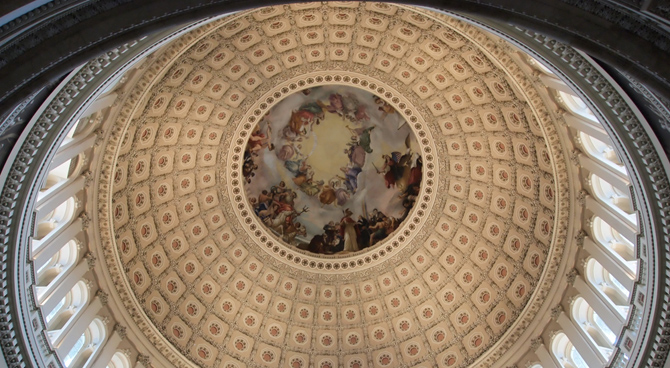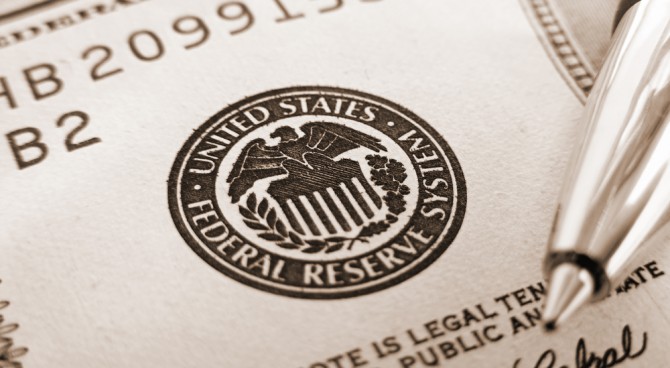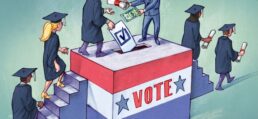Buying votes for the Democratic Party is the only possible justification for such an unfair giveaway of taxpayer money.
By Phil Gramm and Mike Solon
June 29, 2022 2:39 pm ET
Advocates for student-debt forgiveness are open about their political motivation. “It is actually delusional to believe Dems can get re-elected without acting on filibuster or student debt,” Rep. Alexandria Ocasio-Cortez tweeted in December. Rep. Ayanna Pressley said in May: “Democrats win when we deliver, and we have to deliver in ways that are impactful, tangible and transformative, like canceling student debt.” A headline on an April column in the Los Angeles Times read “Elizabeth Warren knows how Democrats can win the midterms. It starts with canceling student loan debt.” The New Republic signaled its agreement: “Biden’s Only Good Pre-Midterm Play: Cancel Student Debt.”
The debate has centered on how debt forgiveness will play politically because no other justification exists. The average student loan borrower leaves college with a debt of $28,400. What do students get for that debt? Over the course of their earning lives, those with only some college gained a lifetime earnings increase relative to someone who only completed high school that is 10 times the average debt incurred. On average a graduate with a bachelor’s degree earns 40 times as much; a graduate with a master’s earns 53 times; and a doctoral graduate earns 80 times as much as the debt. Law and medical degree holders earn almost 100 times as much. Even as the share of the population with a college degree has tripled to 30.7% from 10.5% in 1967, the value of that degree has grown. The wage premium for having a college degree has grown to 96.2% today from 55.9% in 1967.
If Mr. Biden forgives $10,000 of debt for some 45 million borrowers, it would almost certainly be the largest gift to such a large number of voters in American history. Yet while the taxpayer, not the Democratic National Committee, ultimately pays for student-loan forgiveness, the gift won’t be free for Mr. Biden and the Democrats. Debt forgiveness will trigger the political equivalent of Newton’s second law: For every action, there is an equal but opposite reaction. For every vote Mr. Biden’s debt forgiveness may buy for the Democrats, he risks losing multiple votes. The proposed debt forgiveness is opposed by conservatives, moderates and even some liberals, who insist it isn’t justified, legal or a political winner.
The president focuses on 45 million student borrowers as if they were the only voters in America. Yet 97 million other Americans over 25 with at least some college have paid off their loans, have parents or grandparents who sacrificed to cover their college costs by using their retirement savings, went to night school or junior college before going to a four-year college, worked during college, or sacrificed to win academic and athletic scholarships. Another 82 million never went to college. Where do these other 179 million Americans get their $10,000—or don’t they count?
Students aren’t the only people with government debt. Another $500 billion is owed for disaster assistance, other farm programs and emergency assistance. Workers, retirees, small businesses, family farms and corporations will owe the federal government $4.8 trillion in taxes this year alone. They will feel cheated.
Those earning in the top 40% owe 60% of all student-loan debt. Very high earners with doctorates, medical degrees or law degrees owe 40% of all student debt. In the long history of the world’s debt-forgiveness debate, few have ever had a weaker case than American student-loan debtors. President Reagan viewed their argument for relief as so lame that he garnished the wages of government employees to collect defaulted student loans.
Even the liberal Urban Institute finds that “debt forgiveness plans would be regressive—providing the largest monetary benefits to those with the highest incomes.” And since politics has always been its sole justification, what does it say when Colorado Democratic Sen. Michael Bennet rejects its political advantages? “It offers nothing to Americans who paid off their college debts or those who chose a lower price college,” he said earlier this month. “It ignores the majority of Americans who never went to college, some of whom have debts that are just as staggering and just as unfair.”
If the courts strike down executive action forgiving student debt as Mr. Biden, Speaker Nancy Pelosi and numerous other Democrats have occasionally suggested they would, the president would have the worst of both worlds. Few seeking debt forgiveness will vote based on actions that didn’t put money in their pockets. But everyone else will still be livid.
Mr. Biden’s efforts remind us why debt jubilees are ancient relics. To move votes, forgiveness must be meaningful and broad-based. But as politics drives debt forgiveness ever larger, its costs surge and its destructive effect on the economy and social fabric mounts. Government becomes little more than a piñata that voters bash until the goodies fall out. Where does this process end?
The most consequential falsehood in modern American political history was the promise that under ObamaCare if you liked your health plan you could keep it. Yet that same legislation carried a second whopper. The Congressional Budget Office projected that the same bill would pay for $19 billion of ObamaCare’s cost by nationalizing private student debt. Forgiveness and forbearance have already cost taxpayers $31 billion, $8 billion of which was granted to public employees who have greater job security, better pension benefits and higher wages than the average American worker. Mr. Biden’s minimum offer would cost $380 billion more, and Senate Democrats want $950 billion forgiven.
It should be no surprise that Mr. Biden has turned once again to more government largess as his political capital has collapsed. Giving away taxpayer money has become this administration’s only consistent policy. With progressive Democrats increasingly comfortable bearing the label “socialist,” have we now entered the bread-and-circus phase of American democracy?
Mr. Gramm is a former chairman of the Senate Banking Committee and a nonresident senior fellow at American Enterprise Institute. Mr. Solon is a partner of US Policy Metrics.





